Mathematics Exam > Mathematics Questions > Which of the following differential equations...
Start Learning for Free
Which of the following differential equations is not homogeneous one?
- a)(x2 - y2)dx + 2xydy = 0
- b)


- c)(1 + ex/y)dx + ex/y(1 - x/y)dy = 0
- d)(2x - 3y - 5)dy + (3x + 2y - 5) dx = 0
Correct answer is option 'D'. Can you explain this answer?
| FREE This question is part of | Download PDF Attempt this Test |
Verified Answer
Which of the following differential equations is not homogeneous one?a...
Definition : Homogeneous Differential Equation.
The differential equations which can be expressed as

are called homogeneous differential equations. Thus differential equation (a) is homogeneous because this can be written as

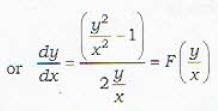
Differential equation (b) is homogeneous because this can be written as
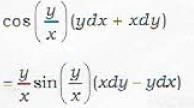
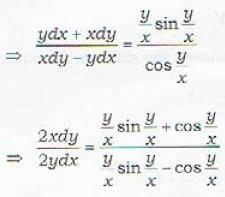
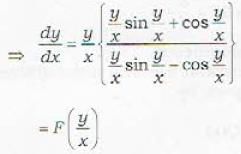
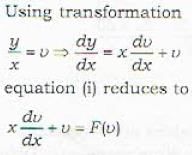
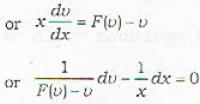
which is of the type
P(u) dv - Q(x) dx = 0 ...(ii)
(i.e.seperated variables)
Hence it is exact.
The differential equations which can be expressed as

are called homogeneous differential equations. Thus differential equation (a) is homogeneous because this can be written as


Differential equation (b) is homogeneous because this can be written as





which is of the type
P(u) dv - Q(x) dx = 0 ...(ii)
(i.e.seperated variables)
Hence it is exact.
Most Upvoted Answer
Which of the following differential equations is not homogeneous one?a...
Definition : Homogeneous Differential Equation.
The differential equations which can be expressed as

are called homogeneous differential equations. Thus differential equation (a) is homogeneous because this can be written as


Differential equation (b) is homogeneous because this can be written as





which is of the type
P(u) dv - Q(x) dx = 0 ...(ii)
(i.e.seperated variables)
Hence it is exact.
The differential equations which can be expressed as

are called homogeneous differential equations. Thus differential equation (a) is homogeneous because this can be written as


Differential equation (b) is homogeneous because this can be written as





which is of the type
P(u) dv - Q(x) dx = 0 ...(ii)
(i.e.seperated variables)
Hence it is exact.

|
Explore Courses for Mathematics exam
|

|
Similar Mathematics Doubts
Which of the following differential equations is not homogeneous one?a)(x2- y2)dx + 2xydy = 0b)c)(1 + ex/y)dx + ex/y(1 - x/y)dy = 0d)(2x - 3y - 5)dy + (3x + 2y - 5) dx = 0Correct answer is option 'D'. Can you explain this answer?
Question Description
Which of the following differential equations is not homogeneous one?a)(x2- y2)dx + 2xydy = 0b)c)(1 + ex/y)dx + ex/y(1 - x/y)dy = 0d)(2x - 3y - 5)dy + (3x + 2y - 5) dx = 0Correct answer is option 'D'. Can you explain this answer? for Mathematics 2024 is part of Mathematics preparation. The Question and answers have been prepared according to the Mathematics exam syllabus. Information about Which of the following differential equations is not homogeneous one?a)(x2- y2)dx + 2xydy = 0b)c)(1 + ex/y)dx + ex/y(1 - x/y)dy = 0d)(2x - 3y - 5)dy + (3x + 2y - 5) dx = 0Correct answer is option 'D'. Can you explain this answer? covers all topics & solutions for Mathematics 2024 Exam. Find important definitions, questions, meanings, examples, exercises and tests below for Which of the following differential equations is not homogeneous one?a)(x2- y2)dx + 2xydy = 0b)c)(1 + ex/y)dx + ex/y(1 - x/y)dy = 0d)(2x - 3y - 5)dy + (3x + 2y - 5) dx = 0Correct answer is option 'D'. Can you explain this answer?.
Which of the following differential equations is not homogeneous one?a)(x2- y2)dx + 2xydy = 0b)c)(1 + ex/y)dx + ex/y(1 - x/y)dy = 0d)(2x - 3y - 5)dy + (3x + 2y - 5) dx = 0Correct answer is option 'D'. Can you explain this answer? for Mathematics 2024 is part of Mathematics preparation. The Question and answers have been prepared according to the Mathematics exam syllabus. Information about Which of the following differential equations is not homogeneous one?a)(x2- y2)dx + 2xydy = 0b)c)(1 + ex/y)dx + ex/y(1 - x/y)dy = 0d)(2x - 3y - 5)dy + (3x + 2y - 5) dx = 0Correct answer is option 'D'. Can you explain this answer? covers all topics & solutions for Mathematics 2024 Exam. Find important definitions, questions, meanings, examples, exercises and tests below for Which of the following differential equations is not homogeneous one?a)(x2- y2)dx + 2xydy = 0b)c)(1 + ex/y)dx + ex/y(1 - x/y)dy = 0d)(2x - 3y - 5)dy + (3x + 2y - 5) dx = 0Correct answer is option 'D'. Can you explain this answer?.
Solutions for Which of the following differential equations is not homogeneous one?a)(x2- y2)dx + 2xydy = 0b)c)(1 + ex/y)dx + ex/y(1 - x/y)dy = 0d)(2x - 3y - 5)dy + (3x + 2y - 5) dx = 0Correct answer is option 'D'. Can you explain this answer? in English & in Hindi are available as part of our courses for Mathematics.
Download more important topics, notes, lectures and mock test series for Mathematics Exam by signing up for free.
Here you can find the meaning of Which of the following differential equations is not homogeneous one?a)(x2- y2)dx + 2xydy = 0b)c)(1 + ex/y)dx + ex/y(1 - x/y)dy = 0d)(2x - 3y - 5)dy + (3x + 2y - 5) dx = 0Correct answer is option 'D'. Can you explain this answer? defined & explained in the simplest way possible. Besides giving the explanation of
Which of the following differential equations is not homogeneous one?a)(x2- y2)dx + 2xydy = 0b)c)(1 + ex/y)dx + ex/y(1 - x/y)dy = 0d)(2x - 3y - 5)dy + (3x + 2y - 5) dx = 0Correct answer is option 'D'. Can you explain this answer?, a detailed solution for Which of the following differential equations is not homogeneous one?a)(x2- y2)dx + 2xydy = 0b)c)(1 + ex/y)dx + ex/y(1 - x/y)dy = 0d)(2x - 3y - 5)dy + (3x + 2y - 5) dx = 0Correct answer is option 'D'. Can you explain this answer? has been provided alongside types of Which of the following differential equations is not homogeneous one?a)(x2- y2)dx + 2xydy = 0b)c)(1 + ex/y)dx + ex/y(1 - x/y)dy = 0d)(2x - 3y - 5)dy + (3x + 2y - 5) dx = 0Correct answer is option 'D'. Can you explain this answer? theory, EduRev gives you an
ample number of questions to practice Which of the following differential equations is not homogeneous one?a)(x2- y2)dx + 2xydy = 0b)c)(1 + ex/y)dx + ex/y(1 - x/y)dy = 0d)(2x - 3y - 5)dy + (3x + 2y - 5) dx = 0Correct answer is option 'D'. Can you explain this answer? tests, examples and also practice Mathematics tests.

|
Explore Courses for Mathematics exam
|

|
Suggested Free Tests
Signup for Free!
Signup to see your scores go up within 7 days! Learn & Practice with 1000+ FREE Notes, Videos & Tests.


















